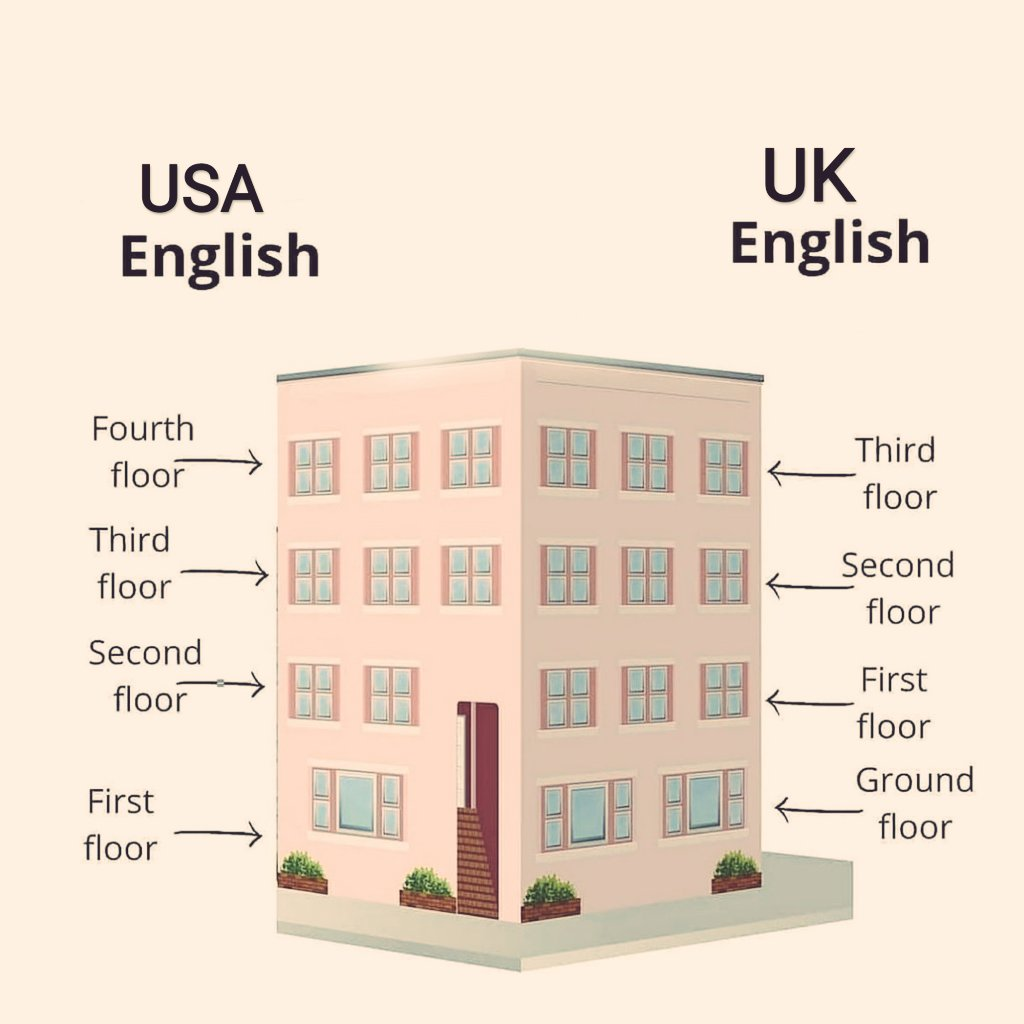I still don’t know if it goes ground floor, second floor or ground floor, first floor, second floor

Red has first floor = ground floor. Blue has first floor above ground floor.
But how are floors counted in Antarctica?
They are on stilts - you can walk underneath the first floor!
The US base calls them first level and second level. The British base calls them operational level and upper level.
So the ground is ground floor? Clever.
I think it depends on the convention used in each country, so there isn’t one global correct answer.
In Britain the convention is Ground, 1st Floor, 2nd Floor.
TIL. Living in the states I thought the answer is obviously that the ground floor and first floor are synonymous.
Agreed. For the other side of the Atlantic, it is ground or 1st floor, 2nd floor.
Makes sense, I’m in Quebec and that’s what feels right to me but I didn’t realize it was different elsewhere, it explains my confusion in Internet conversations
I agree with the UK one as in Spain we do pretty much the same.

0 index versus 1 index, the classic counting collections conundrum.
My North American mind cannot comprehend the UK version.
“First” floor implies it is the first one. Why does the ground floor get special treatment?
And the fourth floor, it’s the fourth one because there are four of them.
Other countries treat the question more as “how many floors from the ground are you?” than what you’re used to. After all, what floor is 0?
My inner computer scientist likes this framing, and understands its logic. My inner, and much less influential human being, hates it a lot AF.
Even in the CS world, ordinal phrases are still 1-indexed (e.g. the first element of an array vs element 0).
The one where it says 0 on the elevator?
But in the US way, you’re only one floor from the ground on the first floor. 0 isn’t a floor, it’s literally the ground we put the first floor on.
To reach the 2nd floor you need to go up 2 floors
To reach the 1st floor you need to go up 1 floor
If you go up 0 floors, you’re on floor 0 - aka the ground floor.
The ground floor is still a floor of the building, and it’s the first one you encounter. To me they are interchangeable.
Alright, fair point. Clearly there are merits to both systems (see other answers). If there’s a floor -1 and a floor 1 I’d expect there to be a floor 0 between them, and I don’t think anyone would propose that floor 0 would have you climb down from street level to reach. That’s why it makes sense to have ground floor at 0 to me.
It also might help to call them floor 1, floor 2 etc. instead of first floor, second floor, etc… It’s kind of like how the 20th century is the one going 19xx. So the 20th floor being floor 19 isn’t too farfetched.
What do you mean I’m overthinking this?!
In an elevator, or I guess a lift, what do the buttons that select floors represent the ground floor with? A ‘G’? A “0”?
Both appear and are considered interchangeable
Iirc it used to be that the ground floor was semi-basement, with windows at the ground level hence the name.
Arrays are indexed from zero - the UK has the only correct naming approach.
So youre telling me you have 3 cookies in front of you, you’d call them the zeroth, first and second cookies?
Someone asks what cookie youre on and you say second having already eaten 2.5?
I am aghast that you assume I use floats anywhere in my code. The cookie has an eaten flag and in one tick it goes from false to true. If you want partial cookie eating tracking we can plan a future update.
How’d y’all communicate with builders? Do you say this building has 0 floors to say that it’s si gle story and say that it has 1 floor to mean that it’s 2-story?
In my head for them ground level is just dirt and doesn’t have a proper floor.
Well in my native language the word for ground floor would translate to something like “next to ground” and above that would be first floor which would be “above ceiling” in direct translation
Because it has a special place, i.e. it’s leveled with the ground, so anything above it you need to climb up, anything below it you need to climb down.
Think of it this way, floor is a synonym with level, if I asked you to tell me which level the ground is at the only logical answer is 0, if you say the ground is at level 1 that implies that the first basement is level 0 which sounds ridiculous.
If you’re in an elevator that has the numbers from -5 to 15, where is the only logical place for the ground to be at?
So to preface this, it’s all arbitrary so there isn’t a right or wrong as long as it’s consistent.
The question might be better phrased this way: are we numbering distance or counting spaces?
If the year is 2024, what century is it? How about if the year is 700? How about if the year is "-700” (700 BCE)? Now which century is the zero century? 🤔 It doesn’t make sense to ask I don’t think.
So really the US System counts the spaces up, then the spaces down as stories. Ground is the same as 1, and Basement is same as -1. I have never ever seen a building (or elevator) with a number line in it or with negative numbers. NOW if you put altitude in the elevator in, say, 10ft increments or so, I would have no choice but to agree with your strange European ways.
No storey is special, no one is special.
It would be more complex if the US didn’t believe in 13th floor story and UK did. Even though both would have 14th floor on the same level from the ground, there is a lot that would be missed if you only elevated straight from the parking basement to your 14th floor.
Imo the first floor should be the ground floor and the floor above that is the second floor.
It depends on where you are.
Second floor.
(Yeah, sorry, I could not resist)
Take your up vote and get out
How do you know?
This might be a misconception but I think like it might depend on how the people think about the concept on a regional basis.
If it’s ‘floor’, the ground floor is the first floor. The one above ground floor is second floor.
If it’s ‘etage’, the ground floor is below the first floor. I know ‘étage’ is the french equivalent for ‘floor’ but ‘etager’ is ‘to layer (something on top of something else)’. So you have a building with the basic ground floor, and you ‘étage’ other floors on top.
Yeah there’s no confusion in French because “étage” literally means “floor above ground”, so calling the ground floor an “étage” makes no sense. It’s called “rez-de-chaussée” (“at street level”) or RDC for short. Same as “sous-sol” (“under-ground”).
French UK English US English Nème étage Nth floor N+1th floor … … … 3e étage 3rd floor 4th floor 2e étage 2nd floor 3rd floor 1er étage 1st floor 2nd floor RDC Ground floor 1st floor — Street level — 1er sous-sol -1 floor -1 floor 2e sous-sol -2 floor -2 floor … … … Nème sous-sol -N floor -N floor
All I learned from this thread is that the word “floor” looks wrong to me now, on so many levels.
Yes, but we are asking how many levels.
Level 3, Metaphysical, Eye level
🤦
When using the English word ‘floor’ counting ground floor as ‘first floor’ makes sense – ground level still has a floor and it is the first one, but it is still counted differently in different English-speaking countries. Other languages (at least Polish) have separate word for ‘non-ground level of the building’ so those are counted.
In Polish we have the word ‘parter’ for the ground floor (lowest non-basement level of the building) and ‘piętro’ for any level above it. So it is: (‘piwnica’ (basement), ) ‘parter’, ‘1 piętro’, ‘2 piętro’… This makes complete sense… but I still remember it being confusing when I was a kid. A ‘floor’ (the bottom of a room) is ‘podłoga’.
So, answering the question: there are three ‘podłogas’ under the second ‘piętro’ here.
In addition to that, in Czech we sometimes just call what would be the first floor above ground level “mezanin” and shift everything up by one more level, though it’s becoming rare. In the house where I live they got rid of this last time they replaced the elevator. I’ve been joking that they forced me to move up from 2nd to 3rd floor with it.
Look at the buttons in the elevator. ;)
Typically:
1, 2, 3, 4 or
G, 2, 3, 4 or
L, 2, 3, 4Where “L” = “Lobby”.
As others have said, in many countries it’d be:
0, 1, 2, 3 or
G, 1, 2, 3 or
L, 1, 2, 3Edit: also, bold of you to assume there’s an elevator!
But if there’s a star it usually means ground/Street level and not the top floor.
In some UK buildings lifts go G, M, 1, 2, 3
The “M” would be for mezzanine, which is usually either a floor that’s small or at an intermediate height between main floors.
I’m aware, was just giving another option of order.
What century is it if the year is 500? First century. What about if the year is -500 (500 BCE)? It’s the first century BCE. You have now arrived at US numbering of “floors”. Now which century is zeroth? It doesn’t make sense to ask, just like having a floor numbered “zero”. This might be why the ground floor is not special to us.
Are we on the number line, or counting the spaces, or counting additional layers? It’s an arbitrary question or distinction, but it seems like it should be labeled somewhere in the elevator!
The confusion is types of apartments…
Are you talking about a big skyscraper with a lobby?
Or where each building has 4-8 units?
But, “on the second floor” has zero to do with the number on an elevator.
The second floor of a building is the second floor of the building. Whether or not the floor below has apartments doesn’t matter.
You’re in the second floor a building, there’s only one level below you.
It’s just some people will mean “second floor of the building” and meant that very logical thing we just talked about.
And some people mean “second floor of apartments” and who the fuck knows how many floors it took to get apartments started. But those people in America almost always give the building floor instead, because that’s a much higher number.
If you’re paying for a view 10+ floors up, you’re not telling people you got the cheapest available
The US counts floors from 1. Most of the world counts from 0. So the answer would depend on which country OP is in. And this is assuming the building has a flat base.













